中考英语语法动词专项复习
上海中考英语专项练习非谓语动词(中考英语语法专项复习--非谓语动词)
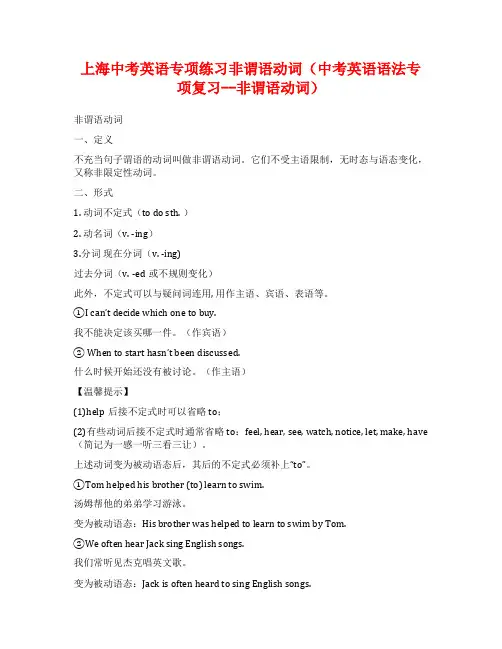
上海中考英语专项练习非谓语动词(中考英语语法专项复习--非谓语动词)非谓语动词一、定义不充当句子谓语的动词叫做非谓语动词。
它们不受主语限制,无时态与语态变化,又称非限定性动词。
二、形式1. 动词不定式(to do sth. )2. 动名词(v. -ing)3.分词现在分词(v. -ing)过去分词(v. -ed或不规则变化)此外,不定式可以与疑问词连用, 用作主语、宾语、表语等。
①I can’t decide which one to buy.我不能决定该买哪一件。
(作宾语)② When to start hasn’t been discussed.什么时候开始还没有被讨论。
(作主语)【温馨提示】(1)help后接不定式时可以省略to;(2)有些动词后接不定式时通常省略to:feel, hear, see, watch, notice, let, make, have (简记为一感一听三看三让)。
上述动词变为被动语态后,其后的不定式必须补上“to”。
①Tom helped his brother (to) learn to swim.汤姆帮他的弟弟学习游泳。
变为被动语态:His brother was helped to learn to swim by Tom.②We often hear Jack sing English songs.我们常听见杰克唱英文歌。
变为被动语态:Jack is often heard to sing English songs.【巧学妙记】只能跟不定式作宾语的动词决心学会有希望(decide, determine, learn, wish, hope),同意计划莫假装(agree, plan, pretend),胆敢拒绝会失败(dare, refuse, fail),准备设法来帮忙(prepare, try, manage, help),提供请求负担起(offer, beg, demand, afford),答应安排理应当(promise, arrange, be supposed),以上后跟不定式,劝君牢记永不忘。
中考英语语法专题分类复习---动词的用法
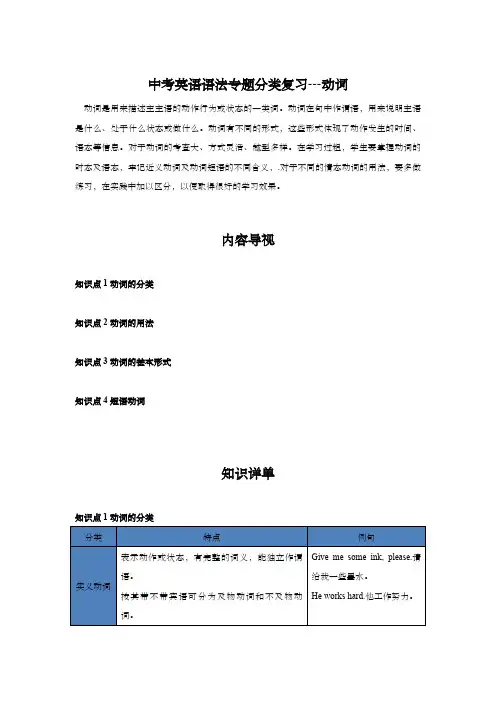
中考英语语法专题分类复习---动词动词是用来描述主主语的动作行为或状态的一类词。
动词在句中作谓语,用来说明主语是什么、处于什么状态或做什么。
动词有不同的形式,这些形式体现了动作发生的时间、语态等信息。
对于动词的考查大、方式灵活、越型多样。
在学习过粗,学生要掌握动词的时态及语态,牢记近义动词及动词短语的不同含义,.对于不同的情态动词的用法,要多做练习,在实践中加以区分,以便取得很好的学习效果。
内容导视知识点1动词的分类知识点2动词的用法知识点3动词的甚本形式知识点4短语动词知识详单知识点1动词的分类知识点2动词的用法1.实义动词2.连系动词3.助动词4.情态动词知识点3动词的甚本形式知识点4短语动词考点突破考点1 考查情态动词的用法1.(矜南中考)Hi, guy ! You______ not park your car here. It's for our customers only.A. needB. canC. willD. may【解析】选B。
由句意可知此处表示“不能在这里停车”,故用can not表示。
2.(安顺中考)-Must I do my homework now?-No,you _________. You may have a rest.A. mustn'tB. needn'tC. can'tD. wouldn't【解析】选B。
must的一般疑问句,否定回答为needn’t或don’t have to.3.(赤峰中考)-Do you have any plans for this weekend?-I'm not sum. I_______ go climbing Mount Tai.【解析】选C, 由答语前半句可知,此处表达不确定的意思,即“也许,可能”。
C项may 有此含义。
4.(遵义中考)She went to Hangzhou by train last night. She_______be at home now.A. must notB.may notC.can't【解析】选C。
初中英语2024届中考语法专项练习(动词和动词+形容词和副词+动词的语态+动词的时态)(附参考答案)
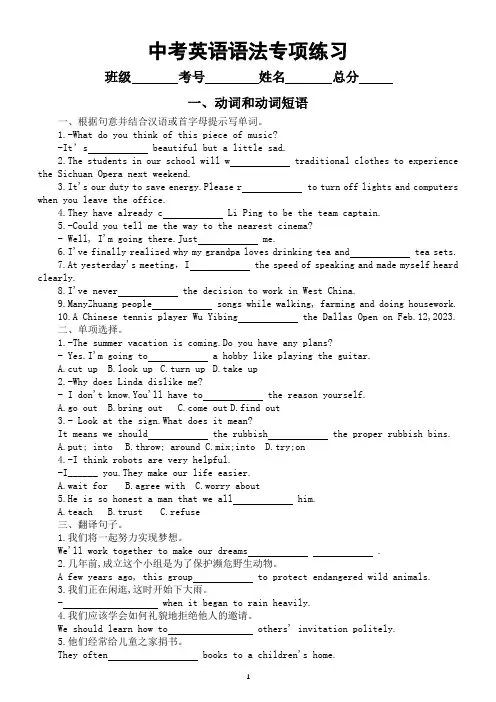
中考英语语法专项练习班级考号姓名总分一、动词和动词短语一、根据句意并结合汉语或首字母提示写单词。
1.-What do you think of this piece of music?-It’s beautiful but a little sad.2.The students in our school will w traditional clothes to experience the Sichuan Opera next weekend.3.It's our duty to save energy.Please r to turn off lights and computers when you leave the office.4.They have already c Li Ping to be the team captain.5.-Could you tell me the way to the nearest cinema?- Well, I'm going there.Just me.6.I've finally realized why my grandpa loves drinking tea and tea sets.7.At yesterday's meeting,I the speed of speaking and made myself heard clearly.8.I've never the decision to work in West China.9.ManyZhuang people songs while walking, farming and doing housework.10.A Chinese tennis player Wu Yibing the Dallas Open on Feb.12,2023.二、单项选择。
中考英语语法总复习(精华版)
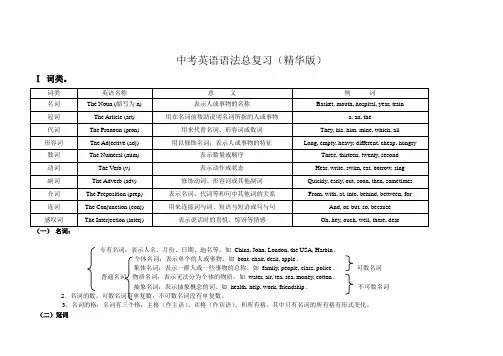
中考英语语法总复习(精华版)Ⅰ词类。
专有名词:表示人名、月份、日期、地名等。
如China, John, London, the USA, Harbin .个体名词:表示单个的人或事物。
如boat, chair, desk, apple .集体名词:表示一群人或一些事物的总称。
如family, people, class, police . 可数名词普通名词物质名词:表示无法分为个体的物质。
如water, air, tea, sea, money, cotton .抽象名词:表示抽象概念的词。
如health, help, work, friendship . 不可数名词 2.名词的数。
可数名词有单复数,不可数名词没有单复数。
3.名词的格:名词有三个格:主格(作主语)、宾格(作宾语)、和所有格。
其中只有名词的所有格有形式变化。
(二)冠词1.定冠词-the .○1特指某(些)人或某(些)事物。
The students are very good.○2说话人与听话人都知道的人或事物。
Where is the toilet ?○3重复提到上文的人或事物。
I have a cat , the cat is white and black .○4表示世界上独一无二的事物。
The moon moves around the earth .○5形容词最高级和序数词前和表示方位的名词前。
I am the oldest . He is the first to school . I live in the south .○6乐器的名称前常用定冠词-the 。
I like playing the piano / violin .○7和某些形容词连用,使形容词名词化,代表某一类人。
We should help the poor .○8放在某些专有名词前。
We will go to visit the Great Wall next week . the people’s Republic of China .○9放在姓氏的复数形式前,表示全家人或夫妇两人。
初中英语语法专项8动词的时态和语态
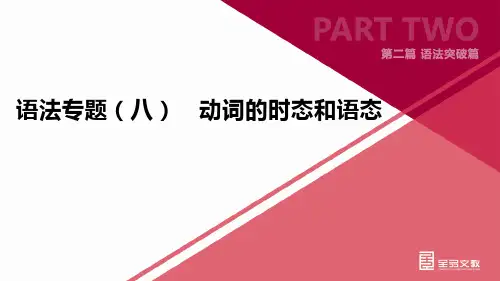
【中考考点】
(1)动词的第三人称单数形式、过去式、过去分词和现在分词的构成。 (2)动词的八种时态的基本结构及用法。 (3)动词的被动语态的基本结构及用法。 (4)动词的主动形式表示被动意义的用法。
动词的时态
考点一 一般现在时
1.结构 一般现在时主要用动词原形表示(当主语是第三人称单数时,谓语动词用第三人称单数形式)。 2.动词的第三人称单数形式变化规则 (1)直接加-s。如:work—works (2)以“辅音字母+y”结尾的词,先变y为i,再加-es。如:carry—carries, cry—cries, try—tries, study—studies (3)以s, x, o, ch, sh结尾的词加-es。如: pass—passes, fix—fixes, go—goes, do—does, teach—teaches, wash—washes (4)特殊:have—has, are—is
动词的时态
考点四 过去将来时
1.结构 would+动词原形 was/were+going to+动词原形 2.用法 表示从过去的某一时刻看,将要发生的动作。 His uncle said that there would be a good harvest the next year.他叔叔说第二年会有一个 好收成。 【注意】 在由if引导的条件状语从句中,如果主句用过去将来时,那么if从句需用一般过去时代替过 去将来时。 If he were here, he would show us how to do it. 如果他在这儿,他就会向我们展示该如何做。
动词的时态
4.动词过去式的变化规则 (1)一般情况下,在动词原形后加-ed。如: watch—watched (2)以不发音的字母e结尾的加-d。如:live—lived (3)以“辅音字母+y”结尾的,变y为i,再加-ed。如: study—studied, carry—carried, cry—cried (4)以重读闭音节结尾,且末尾只有一个辅音字母的,先双写该辅音字母,再加-ed。如: stop—stopped, plan—planned, prefer—preferred (5)不规则动词的过去式需特殊记忆。
2023年中考英语语法---动词及动词短语专题复习及练习题(含答案)
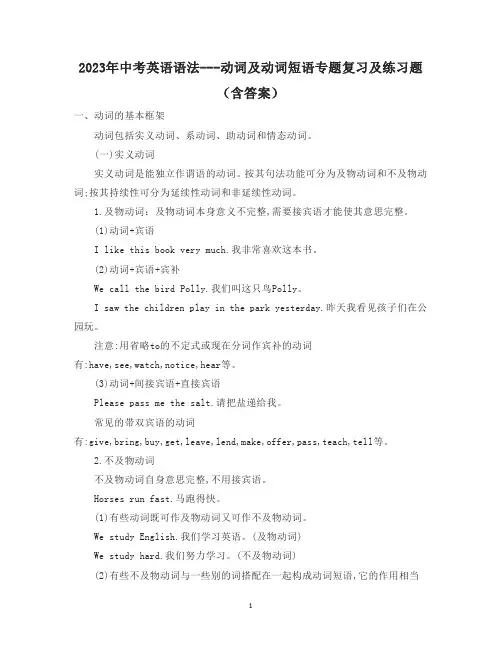
2023年中考英语语法---动词及动词短语专题复习及练习题(含答案)一、动词的基本框架动词包括实义动词、系动词、助动词和情态动词。
(一)实义动词实义动词是能独立作谓语的动词。
按其句法功能可分为及物动词和不及物动词;按其持续性可分为延续性动词和非延续性动词。
1.及物动词:及物动词本身意义不完整,需要接宾语才能使其意思完整。
(1)动词+宾语I like this book very much.我非常喜欢这本书。
(2)动词+宾语+宾补We call the bird Polly.我们叫这只鸟Polly。
I saw the children play in the park yesterday.昨天我看见孩子们在公园玩。
注意:用省略to的不定式或现在分词作宾补的动词有:have,see,watch,notice,hear等。
(3)动词+间接宾语+直接宾语Please pass me the salt.请把盐递给我。
常见的带双宾语的动词有:give,bring,buy,get,leave,lend,make,offer,pass,teach,tell等。
2.不及物动词不及物动词自身意思完整,不用接宾语。
Horses run fast.马跑得快。
(1)有些动词既可作及物动词又可作不及物动词。
We study English.我们学习英语。
(及物动词)We study hard.我们努力学习。
(不及物动词)(2)有些不及物动词与一些别的词搭配在一起构成动词短语,它的作用相当于一个及物动词。
①动词+介词Listen to the teacher carefully.仔细听老师讲。
此类动词短语后面的宾语无论是名词还是代词,都只能放在介词后面,不能放在动词和介词之间。
②动词+副词+介词Let’s go on with our work!让我们继续我们的工作吧!He gets along well with his classmates.他与他的同学们相处得很好。
2023中考英语语法复习之考点专题——动词时态(原卷版)
2023中考英语语法复习之考点专题——动词时态(原卷版)2023中考英语语法复习之考点一网打尽专题十二动词时态目录考点1 一般现在时(一般用法)考点2(易错)一般现在时(表客观事实和真理)考点3(重点)主将从现考点4(易错)主将从现(if宾语从句与状语从句区分)考点5 一般过去时考点6 一般过去时(used to do)考点7(重点) used to do sth/be used to doing sth辨析考点8 一般将来时(be going to)考点9 一般将来时(will/shall)考点10 现在进行时考点11(易错)现在进行时表将来考点12 过去进行时(表示过去某一刻正发生的动作)考点12 过去进行时(表示过去某阶段一直发生的动作)考点13(重点)过去进行时(含when/while 引导的状语从句)考点14 现在完成时(表过去的事对现在的影响:已经做了...)考点15 现在完成时(表过去的事一直持续到现在:一直做....)考点16(重点)现在完成时(have been to/have gone to/have been in辨析)考点17(难点)现在完成时(延续性与非延续性动词)考点18 过去将来时考点19 过去完成时考点1 一般现在时(一般用法)考点讲解1.(2021·上海松江·二模)Tim likes watching films. He _________ to the cinema with his girlfriend once a week.A.goes B.is going C.has gone D.will go2.(2020·湖北恩施)I hear that it often ________ in Sichuan and there are usually floods, especially in summer.A.rains B.rained C.will rain3.(2021·北京房山·二模)Mary ________ her grandparents every weekend.A.visits B.was visiting C.is visiting D.has visited4.(2021·广西桂林)The zebra eats grass, but it ________ eat meat.A.doesn’t B.didn’t C.don’t5.(2021·黑龙江·齐齐哈尔市碾子山区教师进修学校一模)—Do you like the flower? —Yes. It ________ sweet.A.is smelling B.smells C.smelt考点2(易错)一般现在时(表客观事实和真理)考点讲解精选练习6.(2020·天津红桥·二模)In the past, people didn't know the earth ________round the sun. A.going B.goes C.will go D.go7.(2021·吉林长春·模拟预测)The teacher told us that the sun ________ in the east. A.rises B.rise C.rose D.rising考点3(重点)主将从现考点讲解精选练习8.(2021·四川乐山)—What’s your plan for the summer holiday?—I’ll go to Chendu as soon as the school term ___________.A.end B.ends C.will end9.(2021·广西河池)Mrs. Green will take her son to the amusement park if she ________ the tickets.A.got B.gets C.is getting D.will get10.(2021·辽宁丹东)We can’t avoid traffic accidents unless everyone ________ the rules. A.follows B.breaks C.will follow D.will break考点4(易错)主将从现(if宾语从句与状语从句区分)考点讲解精选练习11.(2021·辽宁鞍山)—Tina wants to know if you ________ to the park with us tomorrow. —I’d love to. But if it ________, I may go to the library instead.A.go; will rain B.go; rains C.will go; rains D.will go; will rain12.(2020·黑龙江牡丹江)—I wonder if we ________a farewell party next week. —If we________it, I will call you.A.will have ; have B.have;will have C.will have; will have13.(2021·黑龙江哈尔滨)—I wonder if you ________ us for the English party tomorrow. —If I ________ free, I will go with you.A.will join, am B.will join, will be C.join, am考点5 一般过去时考点讲解精选练习14.(2021·广西贵港)—Where does Bill live? —He ________ me his address, but I can’t remember it now.A.tells B.told C.is telling D.will tell15.(2021·四川达州)— Alice has gone out. — Oh, has she? What time ________ she________?A.has; gone B.will; go C.did; go D.is; going16.(2021·江苏徐州)In my school days, I ________ a lot of reading in English every day. That was how I learned English at that time.A.do B.did C.have done D.will do17.(2021·重庆)Last Sunday my brother and I ________ our grandparents.A.will visit B.visits C.visit D.visited18.(2021·内蒙古兴安盟)— Have you ever been to Shanghai? — Of course. Actually, I________ there for six years, but now I live in Beijing.A.worked B.was working C.would work D.have worked考点6 一般过去时(used to do)考点讲解精选练习19.Mr Jiang isn’t as busy as before because there ___________no home robot to help him.A.used to be B.may be C.used to have D.may have20.I ________ in this small mountain village when I was a child.A.use to live B.used to living C.used to live D.used to life21.(2019·江苏镇江)Yao Ming, a basketball giant , ___________ water polo when he was young.A.is playing B.used to play C.is used to playing D.was playing考点7(重点) used to do sth/be used to doing sth辨析考点讲解精选练习22.(2020·湖南益阳)Diana used to _________ to work, but now she is used to ________ because the road is crowded and she wants to keep fit.A.drive; walk B.drive; walking C.driving; walk23.Dick __________ in America, but he has been ___________ Chinese food since he moved to China.A.used to live; used to eating B.is used to live; used to eat C.is used to live; used to eating D.used to living; used to eat24.—How does your brother go to school? —He ___________ ride a bike, but now he__________ there to keep fit.A.used to; is used to walk B.used to; is used for walking C.was used to; is used to walking D.used to; is used to walking考点8 一般将来时(be going to)考点讲解一般将来时表示将来某个时间要发生的动作,事情或存在的状态,也表示将来经常或反复发生的动作或事情。
中考英语总复习语法专题之动词(verb)知识点清单
语法专题——动词(verb)概述:动词(verb)是表示动作或者是状态的词。
即用来表示主语做什么,或表示1)动词可以按照含义及它们在句中的作用分成四类,即行为动词(也称实义动词)(Notional Verb)、连系动词(Link Verb)、助动词(Auxiliary Verb)和情态动词(Modal Verb)。
说明:有些情况下,有些动词是兼类词。
♣We are having a meeting.我们正在开会。
(having是实义动词)♣He has gone to New York.他已去纽约。
(has是助动词)♣Do you have many homework to do? 你有很多家庭作业要做吗?第一个do是助动词,第二个do是实义动词,“做”2)动词根据其后是否带有宾语,可分为两类,分别是:及物动(Transitive Verb)、不及物动词(Intransitive Verb),缩写形式分别为vt. 和vi.。
说明:同一动词有时可用作及物动词,有时可用作不及物动词。
♣She can dance and sing. 她能唱歌又能跳舞。
(sing在此用作不及物动词)♣She can sing many English songs. 她能唱好多首英文歌曲。
(sing用作及物动词)3)根据是否受主语的人称和数的限制,可分两类,分别是:限定动词(Finite Verb)、非限定动词(Non-finite Verb)♣She sings very well. (sing受主语she的限制,故用第三人称单数形式sings。
)♣She wants to learn English well. 她想学好英语。
(to learn不受主语she的限制,没有词形变化,是非限定动词。
)说明:英语中共有三种非限定动词,分别是:动词不定式(Infinitive)、动名词(Gerund)、分词(Participle),也叫非谓语动词)4) 根据动词的组成形式,可分为三类,分别是:单字词(One-Word Verb)、短语动词(Phrasal Verb)、动词短语(Verbal Phrase)♣The English language contains many phrasal verbs and verbal phrases.英语里有许多短语动词和动词短语。
中考英语语法专项复习动词(考点真题)
英语语法专项复习——动词语法讲解:1.动词的基本形式:动词原形、第三人称单数、过去式、过去分词、现在分词。
2.系动词(be动词, look, sound, smell, feel; get, become, turn, grow; keep, stay)。
3.及物动词(后必须有名词)和不及物动词(后不能直接加名词)。
4.助动词(do/does, did)。
5.情态动词(can/could, will, may, should, must, shall)。
6.时态。
7.语态。
8.非谓语动词(动词不定式to do,做宾语、宾语补足语、目的状语)。
9.动词短语。
一.动词的基本形式:动词原形、第三人称单数、过去式、过去分词、现在分词。
二.系动词(be动词, look, sound, smell, feel; get, become, turn, grow; keep, stay)。
(1)形容词修饰系动词。
(2)系动词无被动语态。
注意:1).He looked _____(sad) because he lost a leg in the war.He looked _____(sad) at his broken leg.分析:第___个look是系动词,翻译为“看起来”,用形容词修饰。
2). ( ) The flowers _____ well and ____ nice.A grow, smellB grow, are smeltC are grown, smellD are grown, are smelt分析:花朵生长,主动态;nice是形容词,推知修饰系动词,而系动词无被动。
三.及物动词(后必须有名词)和不及物动词(后不能直接加名词)。
四.助动词(do/does, did)。
五.情态动词(can/coud, will, may, should, must, shall)1.can 表示能力,“能,会”;表示请求,相当于may,;在否定句和疑问句中表示推测,“可能”。
初中英语2024届中考语法复习非谓语动词专项练习(通用版)(附参考答案和解析)
中考英语非谓语动词专项练习班级考号姓名总分Part 1 基础巩固单项选择。
( )1.-What should we pay attention to mistakes during the exams?- Some details.A.avoiding makingB.avoid to makeC.to avoid makingD.avoiding make( )2.-I tried to make Alice her mind but I found it difficult.Well, I saw you that when I went past.A.changed; doB.changes; doingC.change; to doD.change; doing( ) 3.Our teacher often asks us time.A.not wasteB.don't wasteC.not to wasteD.doesn't waste( ) 4.If there's a lot of work , I'd like to keep on until it is finished.A.doB.to doC.doneD.doing( ) 5.I saw Tom his key in the lock, turn it and open the door.A.putB.puttingC.putsD.to put( ) st night, I found a photo in an old book.It made me of my primaryschool life.A.thinkB.thinkingC.thoughtD.to think( ) 7. Chinese culture,many college students go to foreign countries everyyear.A.SpreadingB.To spreadC.SpreadsD.Spread( ) 8.You can ask Liu Mei with you.A.goB.to goC.goingD.gone( ) 9.The Mid-Autumn Festival means being together.On that day, we should come back with our family members .A.stayedB.staysC.stayD.to stay( ) 10.I'll spend as much time as I can in an old people's home.A.helpB.to helpC.helpingD.helps( ) 11.We talked about new words.A.learnB.learnedC.learningD.to learn( ) 12.Tom has decided a part-time job after he graduates from school.A.doB.to doC.didD.doing( ) 13.Guo Degang's show is very funny.It often makes people relaxed.A.feelB.feelingC.to feelD.felt( ) 14.- I always can't help TV plays with my mobile phone when I'm studying.- It's not a good habit.You are supposed to it.A.watching; correctingB.watch; correctC.watch; correctingD.watching; correct( ) 15.It made him to know that he was on the winning team.A.feel luckyB.to feel luckyC.feel unluckyD.to feel unluckyPart 2 难点突破一、单项选择。
- 1、下载文档前请自行甄别文档内容的完整性,平台不提供额外的编辑、内容补充、找答案等附加服务。
- 2、"仅部分预览"的文档,不可在线预览部分如存在完整性等问题,可反馈申请退款(可完整预览的文档不适用该条件!)。
- 3、如文档侵犯您的权益,请联系客服反馈,我们会尽快为您处理(人工客服工作时间:9:00-18:30)。
以重读闭音节或r音节 结尾,且末尾只有 一个辅音字母
双写该辅音字母, 再加-ed
stop- stopped, stopped
② 不规则动词的变化。(略)
3、动词的现在分词的构成:
动加-ing
Look-looking watch- watching
以e结尾
去e加-ing
come- coming movemoving
▪ 5、过去进行时
▪ ① 过去进行时的用法与现在进行时用法相 同,只不过参照的时间基准点不同。
▪ 过去进行表示过去某一时刻正在进行的动 作。一般和特定的时间状语或状语从句连用。 如:then, at that time, at eight yesterday, this time yesterday, when he came in等。
▪ ② 过去进行时的构成与现在进行时类似, 只不过把be (am, is, are)变为过去式(was, were)
▪ They were watching TV at that time. 他 们那会正在看电视。
▪ They will have a class meeting next Tuesday. 他们下周二将举行班会。
▪ We shall meet at the school gate. 我们将在学 校大门口见。
▪ It is going to rain. 要下雨了。
▪ 4、现在进行时
▪ ① 现在进行时表示现在正在进行或发生的动作, 常与now, at present, at this moment等连用;或与 these days, this week/month等连用,表示现阶段 正在进行的动作。有时还与always, continually, forever等词连用,表示反复出现的动作,代替一般 现在时,表达说话人强烈的感情。如赞扬、不满、讨 厌等。如:
以重读闭音节或r 音节结尾,且末 尾只有一个辅音 字母
先双写该辅音字母, 再加-ing
swim- swimming run- running
以ie结尾且为重 变ie加y再加ing 读开音节
die-dying lie-lying
▪ (二)、掌握动词六种时态的基本结构,主要用法及区别(一般 现在时、一般过去时、一般将来时、过去进行时、现在进行时和 现在完成时)
▪ ②一般将来时的构成:
▪ (1) 一般将来时由“助动词will/shall+动词原形” 构成。其中shall主要用于主语是第一人称(I和we) 的疑问句中。
▪ (2) 也可以用“be going to+动词原形”这个结 构来表示根据目前迹象很有可能发生的某件事情,或 是打算、计划、以及决定要做某件事情等。
▪ ②一般过去时的构成:一般过去时由动词的过去式 构成。
▪ We met each other on the street yesterday. 我 们昨天在街上碰见了。
▪ She often went swimming last year. 她去年经 常去游泳。
▪ They moved the chairs to the table, sat down and began to have supper.
fly- flies,
2、动词的过去式及过去分词的构成 ① 规则动词的变化:
规则动词的过去式和过去分词的构成方法是相同的。
动词特征
变化
例词
一般动词
词尾加-ed
look- looked, looked
以e结尾
词尾加-d
live- lived, lived
以“辅音字母+Y”结尾 变y为i,再加-ed carry-carried, carried
▪ 1、一般现在时
▪ ① 一般现在时常用来表示现在习惯或经常反复发生的动作, ▪ 与always, usually, often, sometimes, every
▪ day (week, month)等连用;表示现在的事实或状态;
▪ 表示主语所具有的特征,性格和能力;以及表示客观事实或普遍 其理。
▪ ②一般现在时的构成:
▪ 一般现在时通常以动词原形表示,但当主语是第三人称单数 ▪ 时,动词原形后需加-s或-es。
▪ She likes biology very much. 她非常喜欢生物。
▪ They often go to school by bike.他们通常骑车上学。
▪ 2、一般过去时 ▪ ①一般过去时表示过去发生的动作或存在的状态,
▪ 他们把椅子搬到桌边,坐下开始吃饭。 ▪ Mary told me that she would stay at home if it
rained.玛丽告诉我如果下雨她就呆在家里。
▪ 3、一般将来时
▪ ① 一般将来时表示将要发生的动作或存在的状态, 常与表示将来的时间状语如next month, tomorrow, in a week, soon等连用。
中考语法专项复习
动词
二、动词考察点分项说明:
一)、掌握动词的现在时第三人称单数、过去式、 过去分词和现在分词四种形式的构成规则;
1、动词现在时的第三人称单数的构成:
动词特征 一般动词
以s, x, ch, sh或o 结尾 以“辅音字母+y”结 尾
变化 词尾加-s
词尾加-es 变y为i再加-
es
例词
look- looks find- finds watch- watches, push- pushes
▪ He is always asking such silly questions.他老 是提这类愚蠢的问题。
▪ ② 现在进行时的构成:
▪ 现在进行时由“be (am/is/are)+V-ing”构成。
▪ They are watching TV now. 他们正在看电视。
▪ The dog is enjoying his meal. 小狗正在吃饭。
